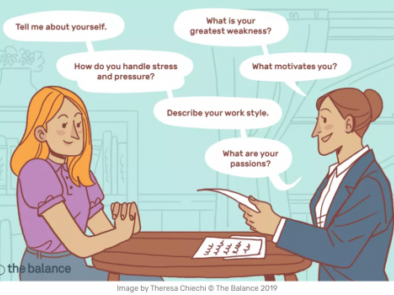
INTERVIEWS
-
INTERVIEWS

For many people, the prospect of an interview is intimidating. However, with practice and preparation, an interview can be a positive experience. The goal is to answer questions about yourself and your experiences, while demonstrating your knowledge of the organization and position.
TYPES OF INTERVIEWS
Interviewers use behavioral based interviews to determine how you’ve handled various job situations in the past. The idea is that your past behavior predicts how you’ll act in the new job. You won’t get many easy “yes” or “no” questions and in most cases, you’ll need to answer with an anecdote about a previous experience.
Interviews that include the interviewer giving you a business scenario and asking you to manage the situation are called case interviews. They’re most often used in management consulting and investment banking interviews and require you to show off your analytical ability and problem-solving skills.
Interviews that require you to give examples of specific skills are called competency-based interviews, or job specific interviews. The interviewer will ask questions that will help them determine if you have the knowledge and skills required for the specific job.
Employers may hold group interviews because they’re often more efficient than one-on-one interviews. There are two types of group interviews: one involves an applicant being interviewed by a group (or panel) of interviewers; the other involves one interviewer and a group of applicants.
Hiring managers may begin the screening process with a relaxed, informal conversation instead of a formal interview. This is more of a casual discussion than a typical job interview. On a similar note, a chat over a cup of coffee is another less formal type of job interview.
An informational interview is used to collect information about a job, career field, industry or company. In this case, you’re the interviewer and you find people to speak with so you can learn more about a specific field.
Additional Information about Informational Interviews can be found here: Cow Creek Career Center Informational Interviews
A mock interview provides you with an opportunity to practice for an interview and receive feedback. Although you can do an informal mock interview with a friend of family member, a mock interview with a career coach, counselor or university career office will give the best feedback.
A panel job interview takes place when you’re interviewed by a panel of interviewers. You may meet with each panel member separately or all together. And sometimes there will be a panel of interviewers and a group of candidates all in one room.
While you’re actively job searching, you may need to be prepared for a phone interview on a moment’s notice. Companies often start with an unscheduled phone call, or maybe you’ll get to schedule your call. In either case, it’s good to be ready and prepared to ask phone interview questions to ask the interviewer as well.
You passed your first interview and you just got an email or call to schedule a second interview. This interview will be more detailed and may be several hours long.
Perhaps you’ve applied for a remote job or you’re interviewing for a position in another state (or country). Software programs such as Skype, Zoom, and FaceTime making video calling easy and video interviews are becoming more common.
GETTING READY FOR THE INTERVIEW
First impressions are very important when interviewing for a job. Take your personal appearance and presentation seriously. Most industries have their own dress code. Industries that prefer professional dress include accounting, banking, consulting, and sales. There are some situations when business casual is acceptable; check with the recruiter if in doubt. It is important to dress professionally for an interview unless you are told otherwise. When unsure, making a conservative choice is safest.
General Tips
- Ensure that your clothing is clean, pressed and fits well.
- Keep jewelry to a minimum.
- Have neat, well-trimmed fingernails.
- Wearing perfume or cologne is not recommended.
- Do not smoke before an interview.
- Bring breath mints.
- Extra copies of your resume and references on resume paper
- Relevant, well-prepared questions
- Portfolio (transcripts, work samples, performance reviews, etc)
- Money (in case you need to pay for lunch or parking)
- Accurate directions, including how long it will take you to get there and how long the interview will last. If possible, try to “test drive” prior to your interview.
- Interviewer contact name and phone number
Actions often speak louder than words. In an interview, it is important to act with professionalism and enthusiasm. Remember that anyone you encounter throughout the day may be asked their opinion of you.
- Check in for your interview five minute before the start time. Arrive to the location earlier, but wait outside or in your car until 5 -10 minutes before your scheduled time.
- Greet the interviewer with a firm handshake.
- Sit up straight and maintain eye contact.
- Show your enthusiasm in a way that feels natural to you, such as smiling when speaking of something that excites you or something of which you are proud.
Studies have shown that people who take the step of preparing for interviews are better able to handle difficult interview questions, adequately communicate their strengths and be themselves.
- Prior to an interview, assess your strengths and weaknesses, skills and abilities, interests, values, goals and aspirations. Be prepared to describe the value that you will bring to the position and organization.
- Be ready to discuss and prove them in the interview by telling your success stories. It is essential that your stories state what you did, how you did it, and what resulted.
- Research the organization, review literature and the company website, know the structure of the organization, the size, the industry, product lines or service, history, revenue and recent news stories.
- Search the Internet to find recent news not mentioned on their website and their public profile.
- Talk to current and past employees to learn more about the organization’s culture.
- Practice responding to questions. Being able to respond to questions well involves anticipating what will be asked, and preparing examples for your responses. When asked a question, you should feel comfortable explaining you response and elaborating with an example. Your answers should be concise, but also complete.
- Select your location carefully. A quiet, distraction-free, room with a neutral background is best. Notify others around you that you will be interviewing and should not be interrupted. Ensure your face is well lit. Avoid bright lighting behind you. The best location for your webcam is at eye-level. Try setting your laptop on a stack of books.
- Present yourself professionally. Dress professionally, just as you would for an in-person interview. Be mindful of your body language. Make eye contact with the camera instead of focusing only on your computer.
- Test your network connection. Confirm your audio and video are clear and your WiFi connection is strong. If possible connect through a router with a network cable. You can test this with Cow Creek staff or friends.
- Minimize interruptions. Close out of other computer programs prior to the interview. Turn off your cell phone.
MOCK INTERVIEWS
Practice makes perfect! Boost your confidence! Refine your Interviewing skills!
A “mock interview” refers to a training practice which uses a simulated actual job interview in order to prepare you for a real interview. For those who have participated in mock interviews it has been proven beneficial. Here’s how:
- Helps the candidate to understand what is expected in a real job interview
- Helps the candidate improve his/her self-presentation
- Provide the candidate with valuable feedback
- Helps candidate to gain confidence for real interviews
- Provides the candidate with important skills to handle an upcoming interview
Mock interviews can be held virtually, by phone, videotaped, and in-person. Contact Cow Creek Career Center to schedule an appointment and discuss how you can best prepare yourself to go confidently into any job interview.
Look back at the original job listing, and make a list of the job qualifications. Then, make a list of your skills and experiences as they relate to those qualifications. This will help you answer important questions about why you are a good fit for the job.
Make a list of common interview questions and think about how you would answer each one. Also think about industry-specific questions you might be asked. You can even find examples of interview questions asked at the company on sites like Glassdoor. Make sure you know how you would answer each question.
You do not want to memorize an answer word for word, because you would sound robotic during an interview. Instead, jot down a few notes for each interview question to remind yourself of the key ideas you want to address in each answer.
The best way to prepare for an interview is to practice in a setting as similar to the actual interview as possible.
Ask a friend or family member to interview you. Have them ask you questions from the list of interview questions you wrote. Ask them to give you constructive feedback about the way you answered the questions, your body language, your professionalism, etc.
You can also practice on your own. Write the interview questions down on flashcards, and practice answering the questions in different orders. Practice answering the questions in a mirror. You can also record your voice or, better yet, film yourself. Look back at the footage to see how well you answered each question. Assess your body language, your eye contact and your tone of voice.
Create an interview space in which you will conduct your practice interviews. Go to a coffee shop or clean off your kitchen table. If a friend is helping you practice, have him or her sit across from you. Wearing your interview outfit will help the experience feel more authentic.
By preparing answers to questions, you will be more confident walking into the actual interview. Rather than struggling to answer each question during the interview, you will be able to focus on connecting with the interviewer.
QUESTIONS?

FEEDBACK WELCOME: Please share your comments and insights regarding this new site with info-education@cowcreek.com.
SEARCH
CONTACT US
2371 NE Stephens Street Suite #100
Roseburg, OR 97470
Email: info-education@cowcreek-nsn.gov
Phone: 541.677.5575
Fax: 541.677.5574
© 2025 COW CREEK BAND OF UMPQUA TRIBE OF INDIANS. ALL RIGHTS RESERVED
